[Authors note: Kit Knightly, from the OffGuardian, recently published ISIS are back and they are faker than ever . He explored the apparent return of the ISIS bogeymen and the media narrative that preempted their re-emergent threat. He observes that ISIS, having taken a break during the alleged COVID-19 pandemic, is seemingly the “creation of marketers and PR firms rather than any geopolitical reality.” This article—Who Are ISIS— was written in June 2018 and offers some of the historical background which strongly suggests Kit Knightly is absolutely right.]
Who Are ISIS?
Despite ISIS’ apparent defeat in Syria and Iraq it seems likely that the ISIS hydra will raise another head elsewhere in the world. Indeed they seem to be able to cling on in U.S held territory, though not Syrian/Russian held territory. The new ISIS is something the US administration are already warning the world to prepare for. With evidence of war crimes committed by the US led coalition in the Syrian City of Raqqa, Nathan Sales, the State Department’s Counter Terrorism Coordinator said on March 2nd 2018:
As we defeat ISIS on the battlefield, the group is adapting to our success. The fight is by no means over – it’s simply moving into a new phase: from military solutions to law enforcement solutions. Increasingly, we’re going to need to supplement our military efforts to defeat ISIS with civilian measures that can ensure the group’s enduring defeat……..We’re not just worried about ISIS core, which as we all know has been degraded quite severely in its territorial holdings in Syria and Iraq, but as that territorial core has eroded, we’ve seen an increase in activity by ISIS elements elsewhere in the world.
It is heartening to know that it was actually the US who defeated ISIS on the battlefield. Perhaps some may be surprised by the US government’s apparent reticence to make greater political capital out of their victory. The warnings from Washington were far from triumphant.
You have to wonder if even they believed in their ‘stunning victory.’ You also have to question what they meant by ‘civilian measures.’ Are we to be drafted? Do they want our young, or are they simply talking about censorship and a crack down on freedom of speech?
According to the US State Department, ISIS will re-emerge in Iraq and Syria, in a different form, and is looking to spread its operations to other countries. The US have decided that three new versions already exist in the form of ISIS-West Africa, ISIS-Philippines, and ISIS-Bangladesh.
If the State Department are right ISIS’ organisational, logistical and central planning capabilities are impressive. Following significant military defeats in the middle east, they can immediately reappear in different locations, thousands of miles apart, simultaneously. Amazing don’t you think? How did they do that?
It’s almost as if there’s an underlying support structure which is able to finance and tactically support ISIS (or whatever they may be called in the future) on an international scale. Given the West’s long standing support for Islamist extremist organisations perhaps we don’t need to look far to identify who is providing that support. Certainly if we look at the rise of ISIS in Iraq and Syria a distinct prime suspect emerges.
During the U.S led coalition’s occupation of Iraq tens of thousands of Islamist extremists were thrown into mass detention centres, along with tens of thousands of other, less extreme, Iraqi’s who had been swept up during coalition raids and protest policing operations. Among the detainees was the future Caliph of the Islamic State Abu Bakr al Baghdadi. It was in Camp Bucca, under US and UK guard, where the Islamic State (and ISIS) initially took shape.
Details about Abu Bakr al Baghdadi’s time in Camp Bucca are sketchy. Some reports stated he was interned for a relatively brief period in 2004 – 2005 while others said he was imprisoned for five years between 2004 -2009. What is undeniable is that Camp Bucca was effectively a radicalisation centre for the Islamists. According to Iraqi strategic analyst Hisham al-Hashim, 17 of ISIS’ top 25 commanders came through the Camp Bucca system.
The US led coalition’s explanation for this “oversight” was that their intelligence, regarding “who was who,” was often lacking and compounded by a lack of interpreters. This meant that relatively innocuous prisoners, snared in by US and Iraqi National Guard ‘policing’ operations, found themselves thrown in with the more hardcore Islamists and radical preachers. Angered by what many saw as their unjust incarceration by the US and its allies, the incarcerated moderates were open to the radical proselytising of the extremists.
When full, Camp Bucca could hold more than 24,000 inmates, split into groups of 1000 in large wire fenced compounds. Following widespread allegations of the abuse of prisoners, some leeway was granted allowing prisoners to attend prayer meetings with other prisoner groups. For the most extreme, this served as the ideal recruitment ground. Former enemies, such as al Qaeda members and Ba’athist Party, were able to meet and plot, in relative safety, against their common foe.
In 2007 U.S military strategy in Iraq was built around the so called ‘surge.’ From a starting point of 132,000 US troops in January 2007, peaking at 168,000 in September, the ‘surge’ saw an increase in US troop deployment and a shift towards mass imprisonment in the hope or reducing combatant numbers. The crack down that accompanied ‘the Surge’ meant it was difficult for the Islamist extremists to congregate in the cities and towns, but they faced no such problems inside the Camp Bucca, Cropper and Taji detentions centres.

In a 2014 briefing paper, the Intelligence Analysis company the Soufan Group stated:
The reshaping of what is now the Islamic State (IS) began among the detainee populations in military prisons such as Camp Bucca in Iraq, where violent extremists and former regime personalities forged mutual interests over years of confinement. IS is now a chimera of Ba’athist and takfiri ideologies, with the organizational skills of the former helping channel the motivational fervor of the latter. The former regime officers who are now senior leaders in IS appear fully committed to the ideals and goals of the group, a result of a thorough radicalization that has extended from imprisonment [. . . ].
Of course, this was all deemed to be a terrible mistake. The result of a combination of short sighted policy decisions and human error by coalition officials struggling to deal with difficult conditions within the camps.
By the time of their closure in 2009, at least 100,000 Islamists had been through the US controlled camp system. As soon as they were released they re-established the networks they had built in the camps, rejoined the jihad, and set about building their caliphate. To start constructing their army they required, experienced fighters, money and armaments. Luckily for them help was on its way.
There is no doubt at all that collaboration with Islamist groups, linked to al Qaeda, was a key strategy in Iraq and Syria. Speaking in 2015 Lieutenant. General Michael T. Flynn, formerly assigned as the Pentagon’s Director of the Defence Intelligence Agency (DIA,) stated the plan to arm the Islamists was a “wilful decision”. He claimed the DIA warned the Obama administration that the policy of working with al Qaeda affiliated groups risked the creation of an ISIS like entity across the entire region. Flynn’s career was ignominiously destroyed when he committed the heinous crime of talking to Russians, instead of calling them names.
However Flynn’s comments were entirely consistent with the available evidence. Following a law suit by Judicial Watch, the DIA released a previously ‘classified’ 2012 report that confirmed the accuracy of Flynn’s statement.
It revealed the Pentagon were fully aware their support (with the notable assistance of Turkey, Saudi Arabia and Qatar) for AQI (al Qaeda in Iraq) and ISI (Islamic State in Iraq) would be likely to lead to the rise of ISIS. The 2012 DIA Intelligence Information Report stated:
If the situation unravels there is the possibility of establishing a declared or undeclared Salafist principality in eastern Syria (Hasaka and Der Zor), and this is exactly what the supporting powers to the opposition want, in order to isolate the Syrian regime, which is considered the strategic depth of the Shia expansion (Iraq and Iran).
It is important to fully understand what this meant. We can paraphrase this statement as follows:
- The continued destabilisation of the region is likely to create the Islamic State. This is precisely what the West, NATO (including Turkey) and its allies in the Persian Gulf want. It will hopefully isolate Syria from its Shi’ah allies and break its strategic alliance with Iran and Iraq and ultimately Russia.
The predicted emergence of a “Salafist principality” was seen as a strategic opportunity to isolate the Syrian government. The document acknowledged, “the Salafist [sic], the Muslim Brotherhood, and AQI [al Qaeda in Iraq] are the major forces driving the insurgency in Syria,” and that, “the West, Gulf countries, and Turkey support the opposition [the insurgency in Syria].”
The creation of ISIS was no accident. It wasn’t the result of policy mistakes but, given the evidence, appeared to be the intended consequence of a deliberate strategy. Either that or the Obama administration were intent upon ignoring their own Defense Intelligence Agency report.
The subsequent level of support the U.S led coalition provided for ISIS renders any claim that this was all an ‘error’ untenable. Flynn was absolutely correct when he said the arming of the Islamists was a “wilful decision.” The Obama administration and other western governments were under no illusions. Their strategy would inevitably lead to the creation of ISIS.
Under the leadership of Abu Bakr al Baghdadi, in 2013 the former camp Bucca, Cropper and Taji detainees allied to AQI and ISI groups, announced a unifying name change to the Islamic State of Iraq and Syria (ISIS.) Fighters and arms started to pour in from the U.S led coalition allies Saudi Arabia, Qatar and notably Libya.
Along with the arms coming from defeated militaries in Libya and Iraq, ISIS received shipments of weaponry manufactured in Eastern Europe. A study from the Conflict Armament Research group (CAR), commissioned by the EU, traced the route of these weapons [which is available to download].
The CAR stated that ‘large numbers’ of these weapons were bought in Europe by US, Saudi and Qatari dealers. The sellers were allegedly “deceived” about the destination, thereby violating the sale and export licenses. The arms were then shipped via the “rat line” through Turkey into Syria. Once in Syria they were distributed by ‘moderate’ terrorists, such as al Nusra (al Qaeda in Syria), to their ISIS counterparts.
This was later confirmed when significant quantities of the traced weapons were found in ISIS controlled territory, such as Tikrit, Ramadi, Falluja and Mosul. However, these shipments were dwarfed by some very lucky coincidences which turned the ISIS terrorist group into a fully equipped army.
Following the withdrawal of the large scale US troop deployment from Iraq in 2011, the Iraqi army were supported by the US led coalition in their fight against the Islamist insurgency. Having destroyed Iraq’s army in 2003, the coalition then spent billions of US taxpayers’ money rebuilding it, with the profits naturally going to the global arms manufacturing corporations. The US left behind Military Transitions Teams (MiTT’s) to oversee the training and deployment of their proxy Iraqi army.
In 2014, a relatively small ISIS force, of no more than a 1000 fighters, took the Iraqi city of Mosul. At the time, the city was defended by two Iraqi Armoured divisions amounting to 30,000 soldiers. Following sporadic skirmishes on the outskirts, as ISIS approached Mosul, the entire Iraqi force simply abandoned their posts and left.
US supplied, state of the art, military hardware, stored at the al-Qayara base in Mosul, was seemingly just handed over to ISIS. Similar mysterious vanishing acts then followed in Ramadi, again with very little military pressure from ISIS, once more giving them access to heavy weapons and equipment.
In the space of a few months, ISIS not only seized hundreds of millions of dollars from various regional banks but had ‘captured’ six divisions of lethal, US supplied, military hardware. This included more than 2000 US Humvee armoured troop carriers, at least 30 M1A1 Abrams main battle tanks, 50 or so 155mm M198 howitzers (artillery guns,) helicopters, thousands of PKC machine guns, rocket launchers and tons of small arms and ammunition.
Recently ‘evidence’ offered by the British and French governments to ‘prove’ that Bashar al Assad gassed his own people in Douma stated that only his Arab Syrian Arab Army possessed the helicopters capable of dropping Chlorine barrel bombs. This was a lie. ISIS also had the required helicopters, ‘seized’ from Mosul and Ramadi.
The reason given for handing ISIS enough military hardware to form an army capable of fighting nation states was simply incompetence and crap training. However, even the worst army in the world knows enough not to simply abandon all its weapons to the enemy. If the Iraqi army were in such a terrified rush to run away, why didn’t they leave in the protection of their armoured vehicles?
Further questions arise in light of the statements made by the Mosul based head of Iraqi intelligence Ahmed al Zarkani. He said that he had repeatedly warned the US puppet government in Baghdad about the approach of ISIS.
According to Zarkani, he informed the government of Nouri al-Maliki on numerous occasions about ISIS training camps being prepared in the Nineveh region; he called for air strikes against their positions; he alerted the local military command and, following prisoner interrogations, he even discovered the time, date and code-name of the impending ISIS attack.
When he reported that the ‘Al-Eres’ (The Wedding Party) operation was imminent, he was shocked to discover, despite all the intelligence he had provided, the commander of the Mosul divisions had ‘gone on holiday.’ Nothing was done at any stage to stop ISIS from seizing their own armoured divisions.
With all its newly acquired American hardware, ISIS needed fighters trained to use it. In 2015, a report from the International Center for Counter Terrorism estimated that 30,000 foreign fighters had joined ISIS. This flow had increased with ISIS’ expansion into Syria in May 2013. Thousands of seasoned, battle hardened terrorists from the Balkans, including fighters from Kosovo, and the Caucasus, such as the Chechen Islamists, came into Syria via the NATO nation of Turkey. Many of these fighters were familiar with heavy weaponry and were capable of flying aircraft. By then, ISIS numbers were conservatively estimated at around 70,000.
The CIA operation to arm, train and equip Islamist terrorists in Syria was called Timber Sycamore. It supposedly began in 2012, it was allegedly phased out in 2017 by the Trump administration as a result of ISIS, and other terrorist groups, military losses to Syrian and Russian forces.
Western coalition special forces also started terrorists training camps in Jordan in 2011. This was basically a continuation of the training programs they had run for the KLA, NLA and al Qaeda in the Balkans.
With a budget of $1billion, thousands of fighters came through the program. Many of these fighters ended up fighting for Al Nusra, whose numbers grew to 20,000 by the alleged end of Timber Sycamore in 2017. In addition the Pentagon was funding the shipment of arms through European countries such as Denmark and Bulgaria on diplomatic flights to avoid inspection. This wasn’t just a US effort, a number of European states were also involved.
However, despite significant ground forces and plenty of armour and weapons, ISIS lacked air support and were vulnerable to air strikes. In 2014 Barrack Obama announced the US intended to launch air strikes against both Iraq and Syria to ‘degrade and destroy‘ ISIS. In reality, nothing could be further from the truth.
After more than 800 sorties, ISIS territory had more than doubled in Syria. Far from ‘degrading and destroying’ ISIS, US air strikes were apparently assisting ISIS in Syria. In fact, they had the effect of pushing ISIS towards Syria, where they seemed to benefit greatly from US bombing. Was this all another monumental mistake?
It is difficult to see how supplying weapons via airdrops to ISIS was degrading them. This happened on numerous occasions. For example, according to Iraqi intelligence, the US had dropped supplies to besieged ISIS fighters in the Yathrib and Balad districts of Iraq. Strangely this ‘accident’ provided ISIS fighters exactly what they most needed at the time, food and armour piercing rounds.
Then there are the numerous occasions when US air strikes appeared to have directly provided a strategic advantage to ISIS.
The isolated Syrian city of Deir Ezzor had been under siege by ISIS for more than a year. However, the Syrian Arab Army (SAA) were holding it, mainly because they had control of the local airport. This enabled the city to be resupplied by Syrian and Russian airdrops. The airport was well protected by SAA artillery positions in the overlooking Tharda hills, giving the SAA a decisive tactical advantage.
ISIS had consistently failed to take these key strategic positions. However, on September 16th/17th 2016 the US launched air strikes against the SAA who were fighting ISIS. As soon as the SAA defences had been destroyed ISIS then launched a large scale attack and seized the positions. It appeared to be a coordinated offensive, timed precisely with the US air strikes. It was no spur of the moment assault by ISIS. Its scale and precision clearly indicated it had been planned well in advance.
Of course the US commanders said this was all an honest mistake. US Brig. Gen. Richard Coe said it was the result of human error. However, forces commanded by Lt. Gen. Jeffrey L Harrigan dispatched a reconnaissance drone to gather intelligence the day before the air strike. They claimed they ‘misinterpreted’ the intelligence, believing the positions were ISIS rather than SAA controlled, despite the fact the fixed SAA positions were no secret.
They US then ‘accidentally’ gave the Russian military the wrong targeting information, rendering them unable to warn the US that they were planning to attack the SAA not ISIS. This contravened a recent ceasefire agreement, which broke down as a result of the air strikes.
As ISIS moved in to take Deir Ezzor the MSM tried to cover up the US support for their assault. The British Daily Telegraph wrote:
The US-led coalition, as well as the Russians, have been bombing the jihadists in Deir Ezzor for the last 18 months but have been unable to dislodge them.
This was a false claim, you could call it disinformation or fake news. The US hadn’t launched any major air strikes against ISIS forces surrounding Deir Ezzor. The US attacks had been against the SAA and vital city infrastructure. For example, in January 2016 the US bombed Deir Ezzor’s electricity plant while the SAA were holding the city.
Again in May 2017 the US hit a convoy of Shi’ah Iraqi militiamen, loyal to Damascus, and a unit of armed Iranians. At the time the Syrian Arab Army, and their Iraqi and Iranian allies, were pushing ISIS back towards Iraq. The northern Syrian city of Raqqa, held by ISIS, was close to being cut off from ISIS supply lines. The convoy was taking heavy weaponry to forward positions in the battle against ISIS. Yet another example of US air strikes benefiting ISIS terrorists.
There is no doubt at all the US coalition were aware of the funding of ISIS by their Gulf allies Saudi Arabia and Qatar. A State Department memo in 2014 stated:
We need to use our diplomatic and more traditional intelligence assets to bring pressure on the governments of Qatar and Saudi Arabia, which are providing clandestine financial and logistic support to Isis and other radical groups in the region.
Are we to believe this was all just another string of ‘mistakes’ which caused unforeseen ‘blowback‘, accidentally creating, arming, equipping, supplying and tactically supporting ISIS? You can if you like, but if you do you need to account for the evidence which suggests otherwise.
Documentation revealed the US led coalition were anticipating the rise of a “Salafist principality in eastern Syria” and it was central to their strategic thinking; ISIS very easily obtained billions of dollars of US military equipment; ISIS benefited from US bombing campaigns in Syria, and the US appeared to have provided them with tactical air support on a number of occasions; the US led coalition were actively training and arming Islamist extremists who went on to fight for ISIS and the West’s Gulf allies were known and accepted to be funding ISIS.
Similarly, the US’ European allies had their own justifications for military action with attacks in London, Paris and Munich to mention but a few. This led them to take offensive actions in Libya, based once more upon ‘flawed intelligence,’ producing the same destabilisation and a perfect environment for the Islamists to gather and spread their form of violent jihad. This, once again, particularly benefited ISIS, who were able to use Libya as staging point for their operations in Iraq and Syria.
Obama’s departure changed nothing. Following the alleged chemical weapons attack on Khan Sheikhoun Donald Trump, who had come into office promising to end foreign wars of intervention, authorised a missile strike on Al Shayrat airfield in a supposed attempt to damage the Syrian’s ability to launch further alleged chemical weapons attacks.
In yet another remarkable ISIS benefiting “coincidence,” it just so happened that the al Shayrat airbase was the centre of Syrian operations against ISIS forces around Homs and Palmyra. Syrian forces had used it to gain a growing military advantage over ISIS. The missile strike greatly reduced the number of air strikes against the terrorists. The missile strike on al Shayrat was another example of the US effectively providing tactical air cover for ISIS.
It is entirely reasonable to conclude that ISIS was created as ‘the bastard army’ of the Anglo-American ‘military industrial intelligence complex’ and its vassal, allied states, notably Turkey, Saudi Arabia and Qatar. Our elected leaders have not led a battle against them because ISIS, knowingly or not, works for same corporate power elite who control the politicians.
All the evidence points to the West’s consistent use of ISIS as a destabilising force in an energy rich part of the world whose impact on the global economy shaped the 20th century and remains a key strategic region at the start of the 21st . ISIS’ murderous barbarity suits the known geopolitical agenda of the Western powers. Cui bono?
Just like the tale you were spun about weapons of mass destruction, prior to the 2003 invasion of Iraq, practically everything you have been told about ISIS and the conflict in Syria is part of a monstrous deception.
Despite their contrition, following the lies they told about Iraqi WMDs, and promises to the public that they would never let them down again, the entire Western mainstream media has cheered the war machine along every step of the way. The simplistic narratives we have been given about ISIS have never mentioned the clear evidence that links the rise of the Caliphate to U.S led coalition objectives.
Every single time people noticed the coalitions military actions seemed to benefit ISIS, the MSM either covered this up with another ‘unfortunate coincidence’ story, accused those who raised these issues of being ‘conspiracy theorists‘ or created entirely false story lines to obfuscate the reality.
Once again, it appears most of us fell for it.

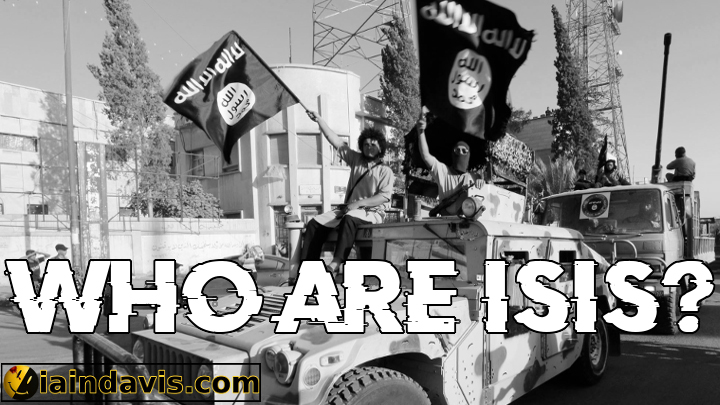
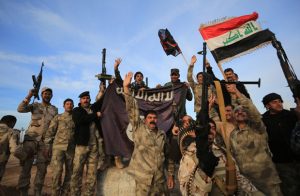
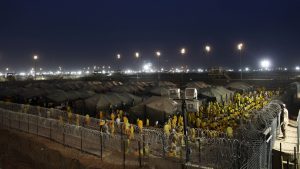

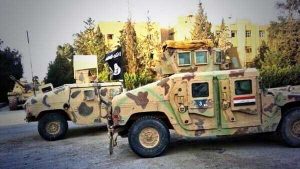
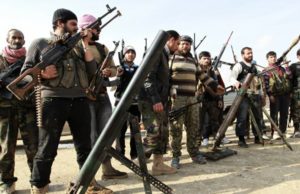
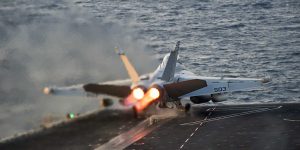







Be the first to comment on "Who Are ISIS"